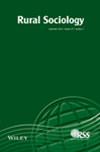农村小城镇政治少数民族身份的维持与养育
IF 1.9
3区 社会学
Q2 SOCIOLOGY
引用次数: 0
摘要
尽管基于地域的党派关系有很好的记录,但很少有学者探讨农村社区内的政治两极分化或政治少数群体如何在小城镇的从众压力中生存。通过对居住在阿巴拉契亚北部一个以保守为主的农村社区的21位父母的采访,本研究使用基于身份的文化在行动模型来分析政治少数群体的父母在面临社区和家庭冲突的情况下如何在2020年总统大选中保持自己的身份。我发现,政治上的少数群体通过利用地方大学作为政治行动、地方权力和子女社会化的资源,来应对他们在社区中的政治身份不被证实的问题。我认为,政治上的少数群体通过强调自己的更高地位、获得文化资本和与党派社会身份相关的价值观,将自己的群体塑造成比社区中的共和党多数派优越的群体,从而维持了自己的身份。然而,在家庭内部,对政治分歧的反应各不相同。虽然有些人保持了自己的党派身份,但其他人采取了温和的立场。温和派依靠文化技巧将政治差异定义为宽容、独立、选择以及道德与政治身份的分离。党派人士利用他们的文化技能,将政治分歧框框为保护儿童免受道德伤害的问题。本研究有助于我们更深入地了解在日益加剧的政治分裂和地理分异中,政治少数群体在协商家庭、社区和政治认同时所使用的应对策略。本文章由计算机程序翻译,如有差异,请以英文原文为准。
Political Minority Identity Maintenance and Parenting in a Rural Small Town☆
Although place‐based partisanship is well‐documented, few scholars explore political polarization within rural communities or how political minorities survive conformity pressures in small towns. Drawing on interviews with 21 parents who reside in a predominantly conservative, rural community in Northern Appalachia, this study uses an identity‐based model of culture in action to analyze how political minority parents maintained their identity during the 2020 presidential election despite facing conflict in the community and their families. I found that political minorities coped with the nonverification of their political identities in the community by using the local college as a resource for political action, local power, and their children's socialization. I argue that political minorities maintained their identities by framing their group as superior to the Republican majority in the community by highlighting their higher status, access to cultural capital, and values associated with their partisan social identity. Within families, however, responses to political disagreements diverged. While some maintained their partisan identities, others adopted a moderate stance. Moderates relied on cultural skills to frame political differences as a matter of tolerance, independence, choice, and separation of morality from political identity. Partisans used their cultural skills to frame political differences as a matter of protecting children from moral harm. This study contributes to a deeper understanding of the coping strategies that political minorities use to negotiate family, community, and political identity amidst increasing political division and geographic sorting.
求助全文
通过发布文献求助,成功后即可免费获取论文全文。
去求助
来源期刊

RURAL SOCIOLOGY
SOCIOLOGY-
CiteScore
4.60
自引率
13.00%
发文量
47
期刊介绍:
A forum for cutting-edge research, Rural Sociology explores sociological and interdisciplinary approaches to emerging social issues and new approaches to recurring social issues affecting rural people and places. The journal is particularly interested in advancing sociological theory and welcomes the use of a wide range of social science methodologies. Manuscripts that use a sociological perspective to address the effects of local and global systems on rural people and places, rural community revitalization, rural demographic changes, rural poverty, natural resource allocations, the environment, food and agricultural systems, and related topics from all regions of the world are welcome. Rural Sociology also accepts papers that significantly advance the measurement of key sociological concepts or provide well-documented critical analysis of one or more theories as these measures and analyses are related to rural sociology.
 求助内容:
求助内容: 应助结果提醒方式:
应助结果提醒方式:


